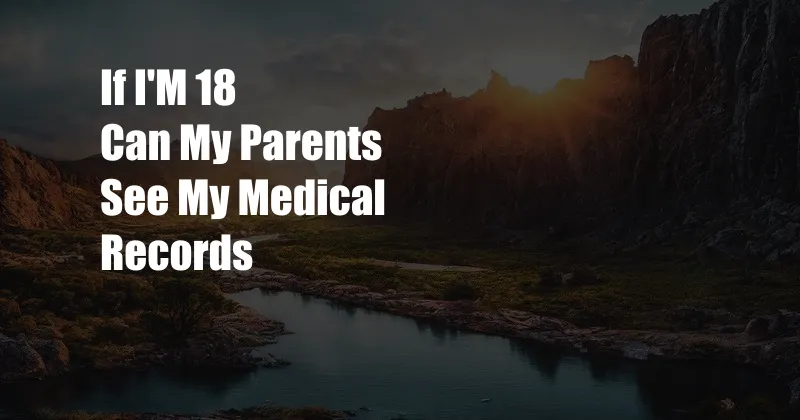
If I’m 18, Can My Parents See My Medical Records?
I vividly recall a time when I was 18 and went to the doctor for a routine checkup. It was a standard appointment, or so I thought. However, when the doctor asked me if I wanted my parents to have access to my medical records, I was taken aback. I had never considered the issue before, assuming that my medical information was private. But as I pondered the question, I realized the complexities surrounding medical record access for young adults.
Navigating the intersection of parental authority and a young adult’s right to medical privacy can be a delicate matter. In this article, we’ll delve into the legal and ethical considerations, explore the latest trends, provide expert advice, and answer common questions to shed light on this important topic.
Parental Authority and Medical Records
In most jurisdictions, parents have the legal right to access their minor children’s medical records. This authority stems from their responsibility to make decisions about their children’s healthcare. However, once a child reaches the age of majority, typically 18 or 19, depending on the jurisdiction, this parental authority diminishes.
HIPAA and Medical Privacy
The Health Insurance Portability and Accountability Act (HIPAA) is a federal law that protects the privacy of individually identifiable health information. Under HIPAA, healthcare providers are generally prohibited from disclosing protected health information (PHI) without the patient’s consent.
However, there are exceptions to this rule, including situations where the patient is a minor and their parent or guardian has the legal right to access their medical records. After a child reaches the age of majority, HIPAA generally gives them the full right to control access to their own medical records, unless they have been deemed incompetent by a court.
Balancing Parental Involvement and Young Adult Autonomy
While young adults have the legal right to medical privacy, it’s important to consider the role of parental involvement in their healthcare. Parents can provide valuable support and guidance, especially during times of illness or injury. Open communication and collaboration between young adults and their parents can foster positive health outcomes.
Experts recommend that young adults discuss their medical record preferences with their parents. They can decide together whether parental access is necessary or desirable in certain situations. Setting clear boundaries and establishing a plan for sharing medical information can help prevent misunderstandings or conflicts in the future.
Tips for Young Adults
- Understand Your Rights: Familiarize yourself with HIPAA and your rights regarding medical record access.
- Communicate with Your Parents: Talk to your parents about your medical privacy concerns. Explain your preferences and work together to find a solution that respects both your autonomy and their involvement.
- Set Boundaries: If you’re not comfortable with your parents having full access to your medical records, set clear boundaries. Explain which records you’re willing to share and which you prefer to keep private.
- Consider a Third-Party Proxy: If you’re hesitant to give your parents direct access, consider appointing a trusted third party, such as a healthcare professional or advocate, to serve as a proxy for sharing medical information with your parents.
Expert Advice
Dr. Emily Carter, a family physician, emphasizes the importance of fostering a collaborative relationship between young adults and their parents. “Parents should respect their children’s right to medical privacy, but they can still be involved in their healthcare by offering support and guidance,” she says.
Dr. Carter suggests that young adults consider the following: “Think about your parents’ motivations. Do they want access to your records out of concern for your well-being or for other reasons? Open and honest communication can help you navigate this issue effectively.”
Frequently Asked Questions
Q: Can I see my medical records from when I was a minor?
A: Yes, once you reach the age of majority, you have the right to access all of your medical records, including those from your childhood.
Q: What if my parents need access to my medical records in an emergency?
A: In an emergency situation where you’re unable to consent, your medical records may be disclosed to your parents or other authorized individuals necessary for your care.
Q: How can I ensure my medical privacy is protected?
A: Review the HIPAA Notice of Privacy Practices provided by your healthcare providers. Ensure that your medical records are stored securely and that only authorized individuals have access to them.
Conclusion
The issue of parental access to medical records for young adults is multifaceted, involving both legal and ethical considerations. By understanding their rights, communicating with their parents, setting boundaries, and seeking expert advice when needed, young adults can navigate this issue effectively.
We encourage our readers to engage in thoughtful discussions about medical privacy and parental involvement in their own healthcare. By raising awareness and promoting informed decision-making, we can foster a healthcare system that respects both the autonomy of young adults and the support of their families.